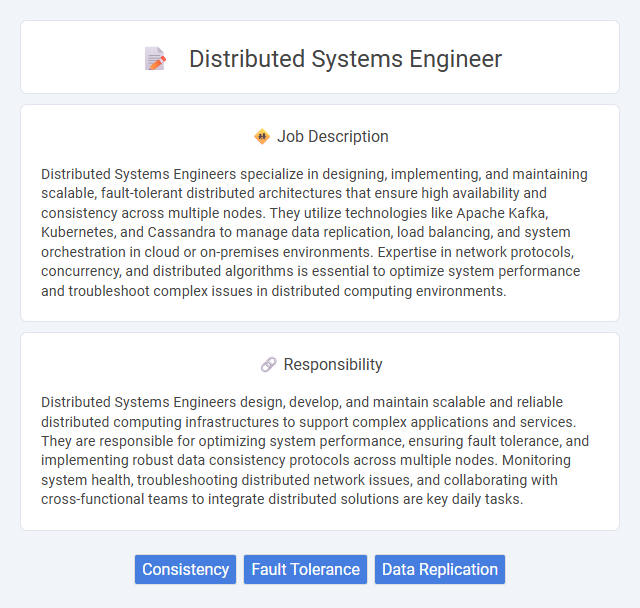
Distributed Systems Engineers specialize in designing, implementing, and maintaining scalable, fault-tolerant distributed architectures that ensure high availability and consistency across multiple nodes. They utilize technologies like Apache Kafka, Kubernetes, and Cassandra to manage data replication, load balancing, and system orchestration in cloud or on-premises environments. Expertise in network protocols, concurrency, and distributed algorithms is essential to optimize system performance and troubleshoot complex issues in distributed computing environments.
Individuals who excel in problem-solving, possess strong analytical skills, and have a deep understanding of network architecture and concurrency are likely suitable for a Distributed Systems Engineer role. Those comfortable working in complex, collaborative environments and adapting to rapidly evolving technologies may find this job fulfilling. People less interested in continuous learning or handling high-pressure troubleshooting might find the position challenging.
Qualification
Expertise in distributed systems design, development, and troubleshooting is essential for a Distributed Systems Engineer. Proficiency in programming languages such as Java, C++, or Python, combined with experience in cloud platforms like AWS or Azure, enhances system scalability and reliability. Strong knowledge of networking, concurrency, and data consistency models is crucial to optimize performance and ensure fault-tolerant architectures.
Responsibility
Distributed Systems Engineers design, develop, and maintain scalable and reliable distributed computing infrastructures to support complex applications and services. They are responsible for optimizing system performance, ensuring fault tolerance, and implementing robust data consistency protocols across multiple nodes. Monitoring system health, troubleshooting distributed network issues, and collaborating with cross-functional teams to integrate distributed solutions are key daily tasks.
Benefit
Distributed Systems Engineers likely enjoy significant career growth due to high demand in cloud computing and large-scale application deployment. They probably benefit from working with cutting-edge technologies that improve system reliability and scalability, enhancing their technical expertise. Competitive salaries and opportunities for remote work may also contribute to attractive compensation packages in this field.
Challenge
A Distributed Systems Engineer likely faces complex challenges related to designing and maintaining scalable, fault-tolerant architectures that ensure seamless communication across multiple nodes. Handling issues like data consistency, network latency, and system failures probably requires deep expertise in algorithms and real-time problem-solving. Mastery in balancing system performance with reliability under varying loads may be crucial for success in this role.
Career Advancement
A career as a Distributed Systems Engineer involves designing, implementing, and maintaining scalable, fault-tolerant networked applications and infrastructure. Mastery of technologies like microservices architecture, cloud computing platforms (AWS, Azure, Google Cloud), and container orchestration (Kubernetes, Docker) significantly boosts professional growth and opens opportunities for senior engineering roles or system architect positions. Continuous learning in areas such as distributed algorithms, performance optimization, and security enhances career advancement and leadership potential in tech-driven organizations.
Key Terms
Consistency
Distributed Systems Engineers design and implement architectures that ensure strong data consistency across multiple nodes to prevent conflicts and data anomalies. They develop protocols such as consensus algorithms (e.g., Paxos, Raft) to maintain consistency in distributed databases and manage state synchronization efficiently. Expertise in CAP theorem trade-offs and consistency models like eventual consistency and linearizability is essential for optimizing system reliability and performance.
Fault Tolerance
A Distributed Systems Engineer specializes in designing and maintaining fault-tolerant architectures that ensure continuous operation despite hardware or software failures. Expertise in consensus algorithms such as Paxos and Raft, along with replication strategies and failure detection mechanisms, is critical for minimizing downtime and data loss. Implementing robust monitoring and automated recovery processes enhances system resilience and operational reliability in large-scale distributed environments.
Data Replication
Distributed Systems Engineers specializing in data replication design and implement robust mechanisms to ensure consistent data availability across multiple nodes and geographic locations. They optimize replication protocols such as synchronous, asynchronous, and multi-master replication to balance latency, fault tolerance, and data consistency. Expertise in distributed databases, consensus algorithms like Paxos and Raft, and cloud-based storage solutions is essential for maintaining high system reliability and minimizing data loss risks.
 kuljobs.com
kuljobs.com